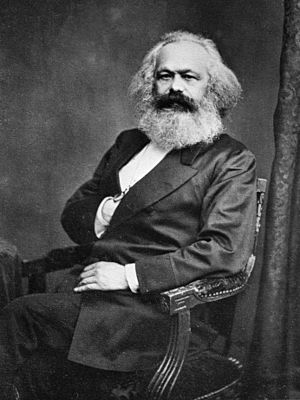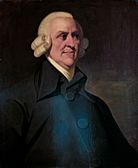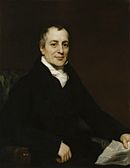Influences on Karl Marx facts for kids
The ideas of Karl Marx came from three main sources. These were German philosophy, French socialism, and British political economy. Understanding these influences helps us see how Marx developed his own important ideas.
German Philosophy
Immanuel Kant's Ideas
Immanuel Kant was a very important philosopher. His ideas helped shape the thinking of Georg Wilhelm Friedrich Hegel. Hegel's way of thinking, called the dialectical method, was used by Karl Marx. This method involves looking at opposing ideas to understand how things change.
Georg Wilhelm Friedrich Hegel's Influence
Hegel was a leading philosopher in Germany. His students divided into two groups: the "Right Hegelians" and the "Young Hegelians." The right-wing group saw Hegel's ideas as fitting with traditional views. The left-wing group, the Young Hegelians, became more revolutionary. This group included Ludwig Feuerbach, Friedrich Engels, and Marx himself.
Marx's view of history, called historical materialism, was shaped by Hegel. Hegel believed that history moves forward through opposing forces. He thought this movement leads to greater understanding and reason. Sometimes this change is slow, and other times it happens through sudden revolutions.
Hegel was an "idealist," meaning he thought ideas were the most important thing. But Marx was a "materialist." He believed that real-world conditions, like how people produce things, are what truly shape society and ideas.
Marx explained his materialist view of history like this:
People work together to produce what they need to live. These ways of working create certain relationships between people. These relationships are the economic structure of society. On top of this structure, laws, politics, and ways of thinking are built. How we produce things shapes our social, political, and intellectual life. Our lives determine our ideas, not the other way around.
Marx thought that societies change because of problems within their material life. He saw history as a series of stages:
- Early societies had a simple form of primitive communism.
- Then came slave states.
- These turned into feudal societies.
- Feudal societies became capitalist states.
- Marx believed that workers, or the proletariat, would eventually overthrow capitalism. This would lead to socialism and then a higher form of communism.
Ludwig Feuerbach's Role
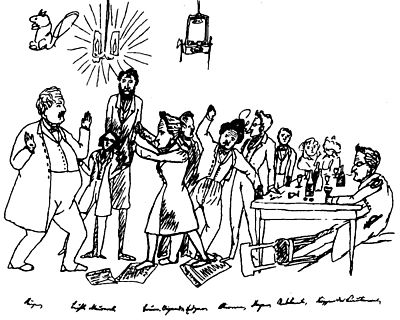
Ludwig Feuerbach was a German thinker who said that people's social and political ideas come from their real-world needs. He believed that our minds are shaped by our environment and what we experience. Marx and Engels liked Feuerbach's focus on people and their needs. They saw it as a step towards understanding society in a material way.
Feuerbach argued that God is a creation of humans. He said that the good qualities we give to God are actually human qualities. Marx took this idea further. He said that the material world is real, and our ideas about it come from this reality. Marx thought that certain ways of thinking, or ideologies, stopped people from seeing the real conditions of their lives.
Marx disagreed with Feuerbach because he felt Feuerbach's ideas were still too abstract. Marx wanted to focus on the "real life process of real human beings." As Marx and Engels wrote:
Instead of starting from ideas, we start from real, active people. We show how their ideas and thoughts come from their real lives. Our thoughts are products of our material life. Morality, religion, and other ideas do not exist on their own. As people change how they produce things and interact, they also change their lives and their thinking. Life shapes consciousness, not the other way around.
In his "Theses on Feuerbach," Marx famously wrote: "Philosophers have only interpreted the world in different ways; the point is to change it." This means Marx wanted to move from just thinking about the world to actively changing it. He believed that philosophy should be about practical action, or "praxis," which combines theory and practice.
Breaking Away from German Idealism
Marx did not study directly with Hegel. But after Hegel died, Marx studied with Bruno Bauer, a leader of the Young Hegelians. However, Marx and Engels later disagreed with Bauer and the other Young Hegelians. They had different ideas about socialism and how to use Hegel's dialectical method.
From 1841, Marx began to move away from German idealism. He and Engels started to focus on the working class in France and Germany.
Marx wrote strong criticisms of the Young Hegelians in books like The Holy Family and The German Ideology. He criticized Bauer and Max Stirner, who believed that all ideals, even "humanity" or "revolution," took away from the individual. Marx also criticized Pierre-Joseph Proudhon, who famously said, "Property is theft!"
Marx's early writings show his break from Hegel and the Young Hegelians. He "stood Hegel on his head" by saying that material conditions shape ideas, instead of ideas shaping material conditions. He got this idea from Feuerbach.
Marx's theory of alienation, explained in his Economic and Philosophic Manuscripts of 1844, was inspired by Feuerbach. Feuerbach said that people project their human qualities onto God, making God seem separate from them. Marx said that this "alienation" was actually caused by the way the economy was set up.
Marx also criticized Feuerbach for not being materialist enough. He argued that human nature is not just an abstract idea. Instead, it is shaped by all the social relationships we have. Marx believed that the idea of the individual was a result of how goods are bought and sold, and how people become separated from their work.
In 1844–1845, Marx focused his studies on political economy. He had been an editor for a newspaper, the Rheinische Zeitung. He fought for freedom of speech and defended peasants' right to collect wood. His struggles with these issues made him realize he needed to study the economic and social roots of society.
English and Scottish Political Economy
Before the 1900s, politics and economics were studied together as "political economy." Marx studied and criticized the ideas of the most famous British political economists of his time.
Adam Smith and David Ricardo
From Adam Smith came the idea that labor creates value and property. Marx criticized Smith and David Ricardo for not seeing that their economic ideas were specific to capitalism. He argued that these ideas could not apply to all societies.
Marx believed that the source of profits in capitalism comes from the value workers create but are not paid for. He explained this using the idea of surplus value. Workers create enough value in a short part of their workday to cover their wages. But they keep working for many more hours, creating extra value. This extra value, or "surplus value," is taken by the capitalists (the owners). So, Marx argued that workers create wealth, but capitalists take it for themselves. He explained this theory of exploitation in his main work, Das Kapital.
Marx also wrote about business cycles, economic growth, and how the rate of profit might decline. These were important parts of his political economy.
French Socialism
Jean-Jacques Rousseau's Ideas
Jean-Jacques Rousseau was one of the first modern writers to question private property. He is sometimes seen as an early thinker for socialism. Rousseau believed that government should ensure freedom, equality, and justice for everyone, no matter what the majority wanted. From Rousseau came the idea of a society where everyone is equal.
Charles Fourier and Henri de Saint-Simon
In the 1830s, France faced many social problems because of the Industrial Revolution. Thinkers like Charles Fourier and the followers of Henri de Saint-Simon proposed big plans for reform. Fourier wanted to create ideal communities. The Saint-Simonians wanted to control the economy through credit. These ideas, though not widely supported, helped expand what people thought was possible for society.
Pierre-Joseph Proudhon's Influence
Pierre-Joseph Proudhon was involved in the French Revolution of 1848. He believed that social and economic reform was more important than just political reform. Proudhon suggested a plan for workers to cooperate financially. He thought this would shift control of the economy from capitalists to workers. Proudhon's book What Is Property? convinced the young Marx that private property should be ended.
Marx initially praised Proudhon. But later, Marx strongly disagreed with Proudhon's ideas, especially his anarchism. Marx wrote The Poverty of Philosophy to argue against Proudhon's book The Philosophy of Poverty. Proudhon's ideas later influenced other thinkers like Mikhail Bakunin.
Other Influences
Lewis H. Morgan's Research
Lewis Henry Morgan wrote about how the Haudenosaunee people of North America lived in a way that he called "communism in living." This research influenced Marx and Engels. However, Morgan's understanding of Haudenosaunee society and his theory of social evolution have since been shown to be flawed. Marx took notes on Morgan's work but did not publish them.
Friedrich Engels' Partnership
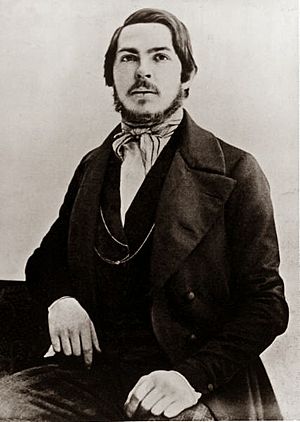
Marx's ideas about Hegelianism were also shaped by Engels' 1845 book, The Condition of the Working Class in England. This book helped Marx see history as a struggle between different social classes. It also made him see the working class as the main force for revolution.
After this, Marx and Engels worked together closely for the rest of Marx's life. Many of their important works, like The German Ideology and The Communist Manifesto, were joint efforts. Engels said that he had a role in creating their theories, but he believed Marx was the true genius.
I helped lay the foundation of the theory, especially in its details. But most of the main ideas, especially in economics and history, and their clear wording, belong to Marx. What I added, Marx could have done without me. What Marx achieved, I could not have done. Marx was greater, saw further, and understood things faster than all of us. Marx was a genius; we others were at best talented. Without him, the theory would not be what it is today. So, it is right that it carries his name.
Charles Darwin's Theories
In 1859, Engels read Charles Darwin's The Origin of Species and told Marx it was "absolutely splendid." Marx later wrote that Darwin's book provided a natural-history basis for his own view of class struggle.
I have read many things these last four weeks. Among them, Darwin's book on natural selection. Even though it's written in a simple English style, this book contains the natural history basis for our view.
Marx also wrote to a friend that "Darwin's work is most important and suits my purpose in that it provides a basis in natural science for the historical class struggle."
Marx saw a connection between Darwin's ideas and the work of Thomas Robert Malthus. He noted that Darwin applied Malthus's theory of population growth to plants and animals. Marx even said that Darwin, by showing "geometrical progression" in nature, actually disproved Malthus's theory about humans.
German communist Wilhelm Liebknecht said that when Darwin's research came out, people talked about nothing else for months. Marx also attended lectures by Thomas Henry Huxley on evolution.
Marx included two notes about Darwin in the second edition of Das Kapital. He called The Origin of Species an "epoch-making work." He also compared the organs of plants and animals to tools, relating it to production and technology.
Engels wrote that Marx was trying to show the same gradual process of change in society that Darwin showed in nature. Some people have seen Marx's view of history as a "social Darwinist" idea of "survival of the fittest" between social classes.
It is clear that Marx liked Darwin's theory and that it influenced his thinking. Marx even sent Darwin a copy of his book Das Kapital in 1873, calling himself a "sincere admirer." Darwin thanked him, saying, "I believe that we both earnestly desire the extension of knowledge."
Scholar Paul Heyer noted that "Marx believed that Darwin provided a materialistic perspective compatible with his own."
Classical Materialism
Marx was also influenced by older ideas of "classical materialism," especially from the ancient Greek philosopher Epicurus. Marx studied Epicurus's ideas about materialism and how things can move freely, which suggested a sense of liberty.


